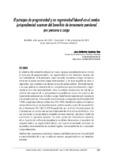The Principle of Labor Progressivity and Non-regressiveness in the Jurisprudential Change: an Exam on the Retirement Pay Increase per Person in Charge of
El principio de progresividad y no regresividad laboral en el cambio jurisprudencial: examen del beneficio de incremento pensional por persona a cargo

View/
Share this
Date
2021-05-19Author
Espinosa Hios, José Guillermo
Citación
Metadata
Show full item recordDocuments PDF
Abstract
The objective of this article is to trace some considerations surrounding the principle of progressivity and non-regressiveness in the worker's social rights. This principle, as it is known, is settled both on national and international grounds and can be demanded not only to the legislator but also to the other branches of the public Power, particularly to the judicial branch in the exercise of its legal and constitutional competencies. For that, the author performs a documental analysis of the jurisprudence on the retirement pay increase per person in the care of, extra-retirement pay benefit, and minimum retirement pay topics. This aid is described in Agreement 049 (1990) and is ruled by Decree 758 (1990). From this perspective, the main objective of this article is to reveal the judicial scenery created by the SU-140/19 Sentence (2019) ruled by the Colombian Constitutional Court in its maximum function of interpreting the Political Constitution. Once the jurisprudence is analyzed, the article states as a conclusion that the Colombian higher courts, in the exercise of their function of unifying the jurisprudence must not disown their duty to labor progressivity and non-regressiveness for as much as this principle is not only related to legal changes but also jurisprudential ones. En el presente artículo de reflexión intento defender la tesis conforme a la cual el principio de progresividad y no regresividad en los derechos sociales, que encuentra sustento normativo tanto en el plano nacional como internacional, se es exigible no solo al legislador, sino que este se hace extensible a las demás ramas de poder público, particularmente, a la rama judicial en ejercicio de las competencias que constitucional y legalmente le han sido encomendadas. Para lo anterior planteo la siguiente premisa: las Altas Cortes de Colombia en ejercicio de su función de unificar jurisprudencia no deben desconocer el mandato de progresividad y no regresividad laboral, en tanto el mentado principio no se predica únicamente de los cambios legales, sino también de las variaciones jurisprudenciales.

